| Listing 1 - 10 of 16 | << page >> |
Sort by
|
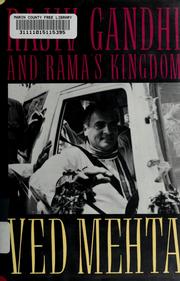
ISBN: 0300060386 Year: 1994 Publisher: New haven Yale University Press
Abstract | Keywords | Export | Availability | Bookmark
 Loading...
Loading...Choose an application
- Reference Manager
- EndNote
- RefWorks (Direct export to RefWorks)
Gandhi,Rajiv --- Gandhi, Rajiv --- Mehta, Ved --- India --- Politics and government --- -Gandhi,Rajiv --- -India --- 1977 --- -India - Politics and government - 1977 --- -India - Politics and government - 1977-
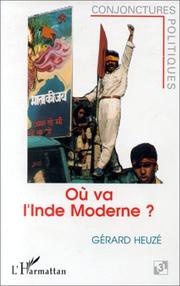
ISBN: 2738417558 9782738417558 Year: 1993 Volume: 3 Publisher: L'Harmattan
Abstract | Keywords | Export | Availability | Bookmark
 Loading...
Loading...Choose an application
- Reference Manager
- EndNote
- RefWorks (Direct export to RefWorks)
India --- Social conditions --- Politics and government --- India - Social conditions - 1947 --- -India - Politics and government - 1977 --- -India
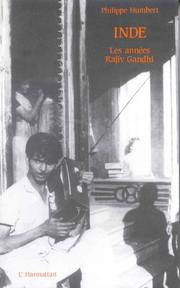
ISBN: 2738408699 9782738408693 Year: 1990 Publisher: Paris : L'Harmattan,
Abstract | Keywords | Export | Availability | Bookmark
 Loading...
Loading...Choose an application
- Reference Manager
- EndNote
- RefWorks (Direct export to RefWorks)
Gandhi, Rajiv, --- India --- Inde --- Politics and government --- Politique et gouvernement --- Gandhi, Rajiv --- India - Politics and government - 1977 --- -Gandhi, Rajiv,
Book
ISBN: 9780198743538 019874353X Year: 2015 Publisher: Oxford Oxford University Press
Abstract | Keywords | Export | Availability | Bookmark
 Loading...
Loading...Choose an application
- Reference Manager
- EndNote
- RefWorks (Direct export to RefWorks)
Following the end of the Cold War, the economic reforms in the early 1990s, and ensuing impressive growth rates, India has emerged as a leading voice in global affairs, particularly on international economic issues. Its domestic market is fast-growing and India is becoming increasingly important to global geo-strategic calculations, at a time when it has been outperforming many other growing economies, and is the only Asian country with the heft to counterbalance China. Indeed, so much is India defined internationally by its economic performance (and challenges) that other dimensions of its internal situation, notably relevant to security, and of its foreign policy have been relatively neglected in the existing literature. This handbook presents an innovative, high profile volume, providing an authoritative and accessible examination and critique of Indian foreign policy. The handbook brings together essays from a global team of leading experts in the field to provide a comprehensive study of the various dimensions of Indian foreign policy.
Book
ISBN: 0333594444 Year: 1994 Publisher: London : MacMillan,
Abstract | Keywords | Export | Availability | Bookmark
 Loading...
Loading...Choose an application
- Reference Manager
- EndNote
- RefWorks (Direct export to RefWorks)
India --- Politics and government --- 1977 --- -Punjab (India) --- India - Politics and government - 1977 --- -Punjab (India) - Politics and government. --- ETAT FEDERAL --- ETHNICITE --- CONFLITS ETHNIQUES --- ISLAM --- HINDOUISME
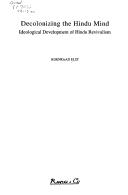
ISBN: 8171675190 9788171675197 Year: 2001 Publisher: New Delhi : Rupa,
Abstract | Keywords | Export | Availability | Bookmark
 Loading...
Loading...Choose an application
- Reference Manager
- EndNote
- RefWorks (Direct export to RefWorks)
Book
ISBN: 0803996659 Year: 1991 Publisher: New Delhi Newbury Park London Sage Publications
Abstract | Keywords | Export | Availability | Bookmark
 Loading...
Loading...Choose an application
- Reference Manager
- EndNote
- RefWorks (Direct export to RefWorks)
Book
Abstract | Keywords | Export | Availability | Bookmark
 Loading...
Loading...Choose an application
- Reference Manager
- EndNote
- RefWorks (Direct export to RefWorks)
815 Geschiedenis --- 820 Internationale Betrekkingen --- 821.5 Mensenrechten --- 841 Politiek Bestel --- 841.1 Democratisering --- 844 Sociale Structuur --- 847 Onderwijs --- 860 (Vredes)cultuur --- 882.4 Noord-Amerika --- 883.5 Zuid-Azië --- India --- Politics and government --- 1977 --- -India - Politics and government - 1977 --- -India --- -815 Geschiedenis --- India - Politics and government - 1977
Book
ISBN: 9782746711969 2746711966 Year: 2008 Publisher: Paris : Autrement,
Abstract | Keywords | Export | Availability | Bookmark
 Loading...
Loading...Choose an application
- Reference Manager
- EndNote
- RefWorks (Direct export to RefWorks)
Un demi-siècle après le règne flamboyant de Nehru, l'Inde est de retour sur la scène internationale. Les successeurs immédiats de Nehru avaient été contraints de se concentrer sur leur région, l'Asie du Sud, le théâtre de tant de guerres au cours des années 1960-1980. Si la vision du monde de Nehru était plutôt globale et idéaliste celle de sa fille et de son petit-fils fut donc plutôt régionale et réaliste. Depuis les années 1990, l'Inde est gouvernée par des hommes qui ont voulu accroître la force de frappe de l'Inde – notamment au plan militaire – et qui ont donc, de nouveau, les moyens de mener une politique globale. Ils ont choisi de le faire sur un mode réaliste, ce qui semble trancher avec la méthode nehruiste. Ce contraste apparent mérite ici d'être nuancé. Certes, l'engagement de Nehru au nom des peuples à disposer d'eux-mêmes l'aurait conduit à s'impliquer davantage que les gouvernants actuels au Népal et en Birmanie. Certes aussi, Nehru aurait répugné à se rapprocher des États-Unis autant qu'eux. Du coup, on est en droit de regretter le non-usage de sa puissance toute neuve par l'Inde car tout se passe comme si la quête de cette puissance était devenue une fin en soi. Mais le fil rouge qui court sur toute la période reflète une continuité fondamentale : la volonté d'indépendance nationale qui sied à un grand pays porteur d'une civilisation à part entière. Ce sentiment national – ce nationalisme devrait-on dire – forme un socle commun à toutes les forces politiques du pays. Ainsi, on voit la gauche communiste et la droite nationaliste hindoue se retrouver aujourd'hui pour condamner un accord nucléaire avec les Etats-Unis qui entame à leurs yeux l'indépendance nationale. Mais Manmohan Singh, le signataire de l'accord, n'est certes pas prêt à hypothéquer cette indépendance nationale. Il ne s'agit pas pour lui d'aliéner la souveraineté nationale mais, de façon pragmatique, d'obtenir l'appui des Etats-Unis pour accélérer la montée en puissance de l'Inde. Manmohan Singh serait donc moins un réaliste qu'un pragmatique.
Geopolitics --- Géopolitique --- India --- Inde --- Foreign relations --- Relations internationales --- Politics and government --- Social conditions --- Economic conditions --- Géopolitique --- India - Politics and government - 1977 --- -India - Foreign relations - 1984 --- -India - Foreign relations - 21st century --- India - Politics and government - 21st century --- India - Social conditions - 21st century --- India - Economic conditions - 21st century --- Relations extérieures --- 1984-....
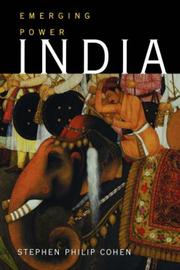
ISBN: 9780815715016 0815715013 Year: 2002 Publisher: Washington (D.C.) Brookings institution
Abstract | Keywords | Export | Availability | Bookmark
 Loading...
Loading...Choose an application
- Reference Manager
- EndNote
- RefWorks (Direct export to RefWorks)
India --- Politics and government --- Economic conditions --- Foreign relations --- -Economic conditions --- -Foreign relations --- -India --- Indland --- Ḣindiston Respublikasi --- Republic of India --- Bhārata --- Indii︠a︡ --- Inde --- Indië --- Indien --- Sāthāranarat ʻIndīa --- Yin-tu --- Bharat --- Government of India --- インド --- Indo --- هند --- Индия --- -India - Politics and government - 1977 --- -India - Economic conditions - 1947 --- -India - Foreign relations - 1984 --- -Foreign relations -
| Listing 1 - 10 of 16 | << page >> |
Sort by
|

 Search
Search Feedback
Feedback About UniCat
About UniCat  Help
Help News
News